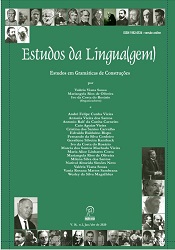The construction of meanings in the use of adjectives ending in -nte: a functional-cognitive approach
DOI:
https://doi.org/10.22481/el.v18i1.6130Keywords:
Usage-Based Functional Linguistics. Construction Grammar. Present participle nominalizing construction. Deverbal adjectives.Abstract
In this paper, we discuss the usage of adjectives ending in –nte, instances of the nominalizing construction of present participle. We aim to explain how these adjectives profile and activate cognitively structured domains of our experience, since linguistic forms represent roughly the conceptualizations constructed by speakers from our experiences with the world. It is a qualitative and quantitative research and, it has descriptive and explanatory objectives. The database are the Corpus Discourse & Grammar, Natal and Rio de Janeiro sections, and the Electronic Corpus of Historical Documents of Sertão, Bahia. The results show that there are three recurring meanings of the present participle adjectives and that there are different degrees of transparency between the adjectives' meanings in use and the frames evoked by their verbal bases. Social and interactional factors contribute to the extension of meanings observed in the use of adjectives formed by the construction.
Downloads
References
BESEDINA, N. Evaluation through Morphology: A Cognitive Perspective. Selected Papers from the 3rd UK Cognitive Linguistics Conference. UK: The United Kingdom Cognitive Linguistics Association, 2012, p. 177-192.
BESEDINA, N. et al. Morphology of number in English: a cognitive perspective. Journal of Language and Literature 2014. V. 5. N. 3. Baku, Azerbaijan: 2014, p. 83-88.
BOOIJ, G. Construction Morphology. Oxford: Oxford University Press, 2010.
_______. Construction Morphology. In: HIPPISLEY, A.; STUMP, G. T. The Cambridge Handbook of Morphology. Cambridge: Cambridge University Press, 2015.
BYBEE, J. Language, usage and cognition. Cambridge: CUP, 2010.
CORDEIRO, F. da S. Construção nominalizadora de particípio presente: uma abordagem funcional centrada no uso. 104f. Dissertação (Mestrado em Estudos da Linguagem) – Programa de Pós-graduação em Estudos da Linguagem, Universidade Federal do Rio Grande do Norte, Natal, 2017.
CORDEIRO, F. da S.; BISPO, E. B. Aspectos funcionais da construção nominalizadora de particípio presente. Revista do GELNE, v. 19, p. 39-52, 2017.
CROFT, W. Radical construction grammar: syntactic theory in typological perspective. Oxford: Oxford University Press, 2001.
CROFT, W.; CRUSE, A. Cognitive Linguistics. Cambridge: Cambridge University Press, 2004.
CROFT, W.; CLAUSNER, T.C. Domains and image schemas. Cognitive Linguistics 10 (1). Berlim: Walter de Gruyter, 1999, p. 1-31.
FILLMORE, C. J. Frame Semantics. In: The Linguistic Society of Korea (ed.) Linguistics in the morning calm. Seoul: Hanshin, 1982, p. 111-137.
FRIED, M. Representing contextual factors in language change: between frames and constructions. In: BERGS, A. & DIEWALDS, G. (Ed.). Contexts and constructions. Amsterdam: John Benjamins Publishing Company, 2009.
_______. Construction Grammar. In: ALEXIADOU, A.; KISS, T. (Ed.) Handbook of sintax. 2. ed. Berlin: Walter de Gruyter, 2015. p. 974-1003.
_______.; ÖSTMAN, J. Construction grammars: cognitive grounding and theoretical extensions. Amsterdam/Philadelphia: John Benjamins Publishing Company, 2005.
FURTADO DA CUNHA, M. A.; SILVA, J. R.; BISPO, E. B. O pareamento forma-função nas construções: questões teóricas e operacionais. Revista Linguística, v. Espec., p. 55-67, 2016.
FURTADO DA CUNHA, M. A.; BISPO, E. B.; SILVA, J. R. Linguística funcional centrada no uso. In: CEZARIO, M. M.; FURTADO DA CUNHA, M. A. (Orgs.). Linguística centrada no uso – uma homenagem a Mário Martelotta. Rio de Janeiro: Mauad: FAPERJ, 2013. p. 13-39.
FURTADO DA CUNHA, M. A.; TAVARES, M. A. Funcionalismo e ensino de gramática. Natal: EDUFRN, 2007.
GIVÓN, T. Funcionalism and grammar. Amsterdam/Philadelphia: John Benjamins, 1995.
GOLDBERG, A. E. Constructions at work: the nature of generalization in language. Oxford: Oxford University Press, 2006.
HILPERT, M. Construction Grammar and its application to English. Edimburg: Edimburg Univeristy Press, 2014.
HOPPER, P. J. Emergent grammar. Berkeley Linguistics Society. v. 13. p. 139-157, 1987.
LAKOFF, G.; JOHNSON, M. Philosophy in the flesh: the embodied mind and its challenge to western thought. New York: Basic Books, 1999.
LANGACKER, R. Conceptualization, symbolization and grammar. In: TOMASELLO, M. (Ed.). The new psycology of language. New Jersey, London: Lawrence Erlbaum Associate Publishers, 1998. p. 1-39.
MARTELOTTA, M. Mudança linguística: uma abordagem centrada no uso. São Paulo: Cortez, 2011.
NEGRÃO, E. V. et al. O adjetivo. In: ILARI, R. (Org.). Gramática do Português culto falado no Brasil. v. III: palavras de classe aberta. São Paulo: Contexto, 2014. p. 243-265.
NEVES, M. H. M. Estrutura argumental dos nomes. In: KATO, M. A. (Org.) Gramática do Português Falado V: Convergências. Campinas: Ed. Unicamp/FAPESP, 1996. p. 119-154.
______. Gramática de usos do português. São Paulo: Editora UNESP, 2000.
NORDE, M.; TROUSDALE, G. Exaptation from the perspective of construction morphology. In: NORDE, M.; VAN DE VELDE, F. (Ed.). Exaptation and Language Change. Current Issues in Linguistic Theory. Amsterdam: John Benjamins, 2016, p. 163-195.
TAYLOR, J. Linguistic Categorization: Prototypes in Linguistic Theory. Oxford: Oxford University Press, 1995.
TRAUGOTT, E. Revisiting subjectification and intersubjectification. In: DAVIDSE, K.; VANDELANOTTE, L.; CUYCKENS, H. (eds.). Subjectification, intersubjectification and grammaticalization. Berlin: De Gruyter Mouton, 2010, p. 29-70.
______. Intersubjetification and clause periphery. English Text Constructions. v. 5 (1), p. 7-28, 2012.
TRAUGOTT, E. C.; DASHER, R. B. Regularity in semantic change. Cambridge: Cambridge University Press, 2005.
TRAUGOTT, E. C.; TROUSDALE, G. Construcionalization and Constructional Changes. Oxford: Oxford University Press, 2013.
Downloads
Published
How to Cite
Issue
Section
License

Estudos da Língua(gem) is licensed under a Creative Commons Attribution 4.0 International License.
Authors who publish in the journal Estudos da Língua (gem) agree with the following terms:
The journal Estudos de Língua(gem) maintains the copyrights of the contributions published. These rights include the publication of the contribution and make its content available for free through the portal.







